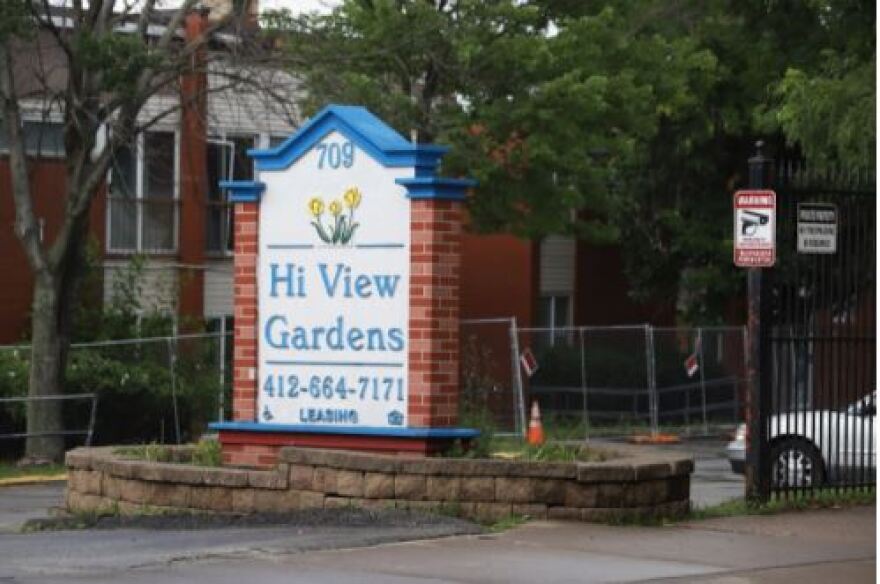PNC Bank's purchase of affordable housing in McKeesport, a 14-mile drive from its corporate headquarters, was more than a bid for some close-to-home community reinvestment. It was part of a nationwide strategy to preserve affordable housing, according to the executive in charge of the bank's 30-community portfolio of subsidized rental properties.
The nation’s seventh-largest commercial bank has, since the 1990s and especially since 2013, carefully monitored the affordable housing market, buying some properties as their rent restrictions were about to expire. PNC’s business plan is not to maximize rents, said Todd Crow, the bank's executive vice president in charge of tax credit solutions. Instead, it tries to harness government programs that can help it to keep rents modest.
“Like any investment, PNC is interested in an appropriate, risk-adjusted return,” Crow told PublicSource and WESA. When it invests in affordable housing, though, financial considerations are “balanced against the equally important goal of preserving long-term contractual affordability and keeping the existing tenants in their homes.”
PNC's purchases in May 2018 of Hi View Gardens and Midtown Plaza are an example of the risks of that strategy. A 2019 application for federal tax credits for use in Hi View was denied, and since then resident complaints to the Allegheny County Health Department have surged and a new tenant council is demanding improvements. The bank is in talks with nonprofit developers about reapplying for tax credits for use in preserving the McKeesport properties.
The bank has been investing in affordable housing for around 20 years, Crow said, and is trying to address a national crisis.
“Nationally, there are millions of families and seniors who lack access to affordable housing,” said Crow. Existing affordable apartments are being converted to market-rate units. “This is a runaway train, and there are no simple answers. Expansion and preservation of affordable rental housing must be a national priority.”
Much of the nation’s affordable housing is underwritten by federal subsidies or low-income housing tax credits, which commit the owner to keep some or all of a property’s units affordable and occupied by low-income households. The tax credit program, in which developers compete for subsidies offered by the federal government and administered by states, is now the primary way new affordable housing is created in the United States.
Under the terms of those programs, the commitments by owners to keep units affordable have expiration dates. There’s “a pretty competitive market” for such properties, said Denise Muha, executive director of the National Leased Housing Association, which represents companies involved in the affordable rental sector.
Crow said that PNC “observed, in an alarming number of cases, that controlling interests in these properties were being sold to buyers who did not intend to preserve long-term affordability.” He said that such buyers would respect the affordability commitments. But once those commitments expired, “they would increase rents, which would almost certainly displace existing tenants.”

Instead of allowing that to happen, PNC began to assemble its funds and those of other investors, mostly other banks, to identify and buy some such properties.
Online, PNC describes the benefits of such investments: increased cash flow, earnings per share and corporate “book value;” preservation of affordable housing; satisfaction of federal Community Reinvestment Act obligations to lend in neighborhoods banks serve; and low risk compared to building new housing.
When PNC invests in an affordable housing property, according to Crow, “we are making an educated bet on a property’s ability to receive an allocation of [tax credits] and, in so doing, extend long-term contractual affordability.” The involved government agencies are generally supportive, he said, but “there are no guarantees that a given property will receive tax credits and other entitlements.” Those decisions are made by state agencies.
In regard to PNC’s McKeesport properties, the Pennsylvania Housing Finance Agency denied the bank’s 2019 tax credit application. Crow said the bank hopes to put together a team to reapply for credits to revamp the 117-unit Hi View complex, and in 2022 for the 11-story Midtown tower.
“Personally,” he said, “I’m as proud of our preservation efforts as anything we’ve done at PNC.”
This story was fact-checked by Matt Maielli and Oliver Morrison.
Rich Lord is PublicSource’s economic development reporter, and can be reached at rich@publicsource.org or on Twitter @richelord.
Kate Giammarise is a reporter covering the impact of COVID-19 on the economy for WESA, and can be reached at kgiammarise@wesa.fm or 412-697-2953.
This content was produced with support from the Doris O'Donnell Innovations in Investigative Journalism Fellowship, awarded by the Center for Media Innovation at Point Park University in Pittsburgh, PA.








